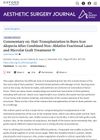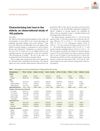 September 2023 in “Clinical, cosmetic and investigational dermatology”
September 2023 in “Clinical, cosmetic and investigational dermatology” A patient with a rare form of lupus improved after treatment for skin ulcers and hair loss on the face and scalp.
 July 2021 in “Aesthetic Surgery Journal”
July 2021 in “Aesthetic Surgery Journal” Using lasers and fat grafting before hair transplant improves hair growth on scarred skin.
 October 2016 in “Journal of the Dermatology Nurses’ Association”
October 2016 in “Journal of the Dermatology Nurses’ Association” Polycystic Ovary Syndrome (PCOS) affects 6%-15% of women of reproductive age, causing symptoms like acne and hair loss, and increasing the risk of type 2 diabetes and heart disease; it's managed through diet, exercise, and medications like Metformin and hormonal contraceptives.
 5 citations,
September 2011 in “Journal of the American Academy of Dermatology”
5 citations,
September 2011 in “Journal of the American Academy of Dermatology” A patient's skin eruption was caused by the cancer drug cyclophosphamide and improved after stopping the drug.
2 citations,
October 2016 in “Nutrition in clinical practice” Vitamin B12 deficiency can cause facial dark spots that go away with treatment.
 August 2023 in “International Medical Case Reports Journal”
August 2023 in “International Medical Case Reports Journal” Acne necrotica can be effectively treated with topical cream and antibiotics.
 10 citations,
February 2016 in “The Journal for Nurse Practitioners”
10 citations,
February 2016 in “The Journal for Nurse Practitioners” Healthcare providers need better education and resources to give competent and sensitive care to transgender patients.
 July 2023 in “International journal of trichology”
July 2023 in “International journal of trichology” Injectable platelet-rich fibrin may stop hair loss from Discoid lupus erythematosus.
2 citations,
September 2019 in “Serbian Journal of Dermatology and Venerology” A rare skin condition causing scarring was successfully treated with topical erythromycin and benzoyl peroxide.
April 2019 in “Journal of the Endocrine Society” A woman with Cushing's syndrome improved after surgery to remove an adrenal tumor.
January 2016 in “Elsevier eBooks” Dermatophycosis is a treatable fungal skin infection spread by contact with infected animals.
 7 citations,
March 2019 in “Journal of The European Academy of Dermatology and Venereology”
7 citations,
March 2019 in “Journal of The European Academy of Dermatology and Venereology” A man developed a skin reaction from metronidazole, which improved after stopping the drug and starting steroids.
 28 citations,
February 2014 in “Journal of Telemedicine and Telecare”
28 citations,
February 2014 in “Journal of Telemedicine and Telecare” Smartphone-based teledermatology is effective for diagnosing skin diseases in the military with good accuracy.
 3 citations,
October 2022 in “Clinical, Cosmetic and Investigational Dermatology”
3 citations,
October 2022 in “Clinical, Cosmetic and Investigational Dermatology” The 532 nm laser effectively reduces facial vascular and pigmented lesions, with the VISIA system reliably assessing treatment results.
 44 citations,
May 2006 in “The Journal of the American Animal Hospital Association/Journal of the American Animal Hospital Association”
44 citations,
May 2006 in “The Journal of the American Animal Hospital Association/Journal of the American Animal Hospital Association” Both treatments for pemphigus foliaceus in dogs are effective, but combination therapy has more side effects.
 2 citations,
June 2012 in “Dermatologica Sinica”
2 citations,
June 2012 in “Dermatologica Sinica” Dermoscopy is useful for diagnosing and monitoring discoid lupus erythematosus by showing specific skin patterns.

EFBL offers hidden incisions, faster recovery, and fewer risks, but may raise hairline and cost more.
1 citations,
July 2012 in “ACM transactions on graphics” The new algorithm accurately captures both facial hair and skin in 3D using a camera-based system.
 16 citations,
January 2019 in “Kansas journal of medicine”
16 citations,
January 2019 in “Kansas journal of medicine” Healthcare providers need better education and policies to serve transgender individuals effectively.
 10 citations,
February 2016 in “Anais Brasileiros de Dermatologia”
10 citations,
February 2016 in “Anais Brasileiros de Dermatologia” Topical minoxidil can cause excessive hair growth in children, so use it carefully.
 September 2019 in “Journal of Investigative Dermatology”
September 2019 in “Journal of Investigative Dermatology” There are various tools available to help psoriasis patients manage their condition, but their effectiveness is unclear and they face issues like lack of financial support.
 12 citations,
November 2018 in “JAMA Dermatology”
12 citations,
November 2018 in “JAMA Dermatology” Collecting sexual orientation and gender identity data in dermatology can lead to better, more sensitive care for sexual and gender minority patients.

A bald man grew hair on his head after taking a drug called diazoxide, but lost it again when he stopped the medication.
 January 2022 in “International journal of zoology and animal biology”
January 2022 in “International journal of zoology and animal biology” Dogs with dermatomyositis, especially Collies and Shetland Sheepdogs, need better treatments for their skin and muscle inflammation.
 3 citations,
March 2019 in “Case Reports”
3 citations,
March 2019 in “Case Reports” A man with myotonic dystrophy type 1 had 28 skin cancers, suggesting a link between the disease and skin cancer, emphasizing the need for sun protection and regular skin checks.
 1 citations,
July 2024 in “International Journal of Innovative Science and Research Technology (IJISRT)”
1 citations,
July 2024 in “International Journal of Innovative Science and Research Technology (IJISRT)” Stopping steroids and providing supportive care improved the patient's Cushing Syndrome symptoms and ulcers.
 2 citations,
March 2019 in “JEADV. Journal of the European Academy of Dermatology and Venereology/Journal of the European Academy of Dermatology and Venereology”
2 citations,
March 2019 in “JEADV. Journal of the European Academy of Dermatology and Venereology/Journal of the European Academy of Dermatology and Venereology” Hair loss in elderly people is often due to health issues and needs better diagnosis and treatment.

Traumatic anserine folliculosis is a harmless skin condition in young males that needs correct diagnosis to avoid unnecessary treatments.
 November 2022 in “Journal of the Endocrine Society”
November 2022 in “Journal of the Endocrine Society” A transman experienced lasting virilization symptoms after stopping testosterone, which were resolved with estradiol treatment.
 December 2016 in “The Journal of Sexual Medicine”
December 2016 in “The Journal of Sexual Medicine” Short-acting testosterone injections in a clinic are a preferred treatment for low testosterone because they work well, are convenient, and patients stick with the treatment.

























